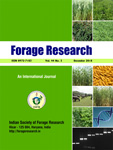SURENDER SINGH,# AND V. P. S. PANGHAL
Department of Botany, Baba Mast Nath University, Rohtak (Haryana), India
Department of Vegetable Science, CCS Haryana Agricultural University, Hisar-125 004 (Haryana), India
*(e-mail : vijaypalpanghal@gmail.com)
(Received : 25 May 2022; Accepted : 15 June 2022)
SUMMARY
Nutrients play an important role in increasing quantity and quality of the crop produce. Consequently, an experiment was conducted for two years in a split plot design with 32 treatment combinations consisting of two varieties and four levels of vermicompost as main plot treatments and four levels of phosphorus as sub plot treatments. The fenugreek variety HM-103 showed its superiority over HM-57 for all the growth, seed yield attributing characters and benefit to cost ratio. Application of vermicompost at 4.0 t/ha significantly increased seed yield (16.83 q/ha), straw yield (32.50 q/ha) and biological yield (20.14 q/ha) to the tune of 45.08, 10.32 and 20.14% over control, respectively, which was at par with higher dose (5 t/ha). Likewise, the application of phosphorus 40kg/ha significantly increased seed yield (16.04 q/ha), straw yield (33.31 q/ha) and biological yield (49.16 q/ha) to the tune of 15.15, 15.90 and 15.21% over control, respectively, which was significantly
at par with higher dose, i.e. 60 kg/ha. Hence, in the Northern plains of India fenugreek variety HM103 is more profitable with the application of vermicompost 4 t/ha and phosphorus 40 kg/ha.
Key words: Vermicompost, phosphorus, variety, fenugreek, phenological, economics

